广东省深圳市龙华区2022-2023年初中英语九年级下册 Module 3 Unit 5 Sport Grammar 课件 (共26张PPT)
文档属性
| 名称 | 广东省深圳市龙华区2022-2023年初中英语九年级下册 Module 3 Unit 5 Sport Grammar 课件 (共26张PPT) | 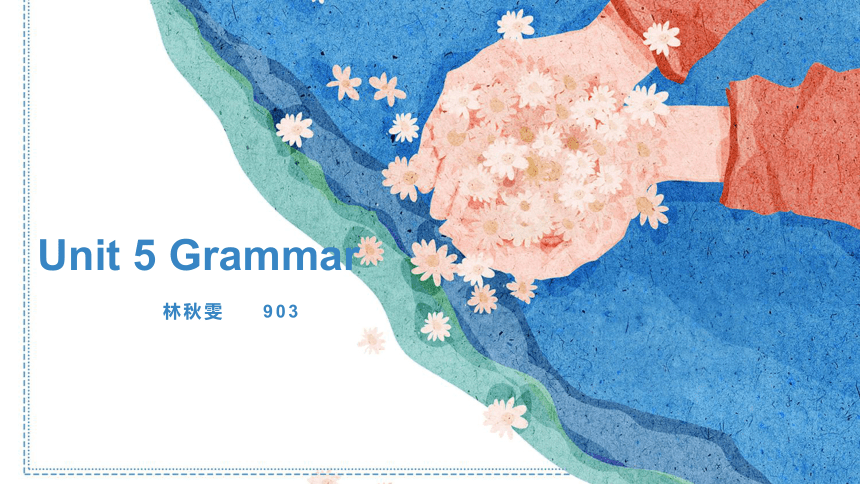 | |
| 格式 | zip | ||
| 文件大小 | 16.1MB | ||
| 资源类型 | 教案 | ||
| 版本资源 | 牛津深圳版 | ||
| 科目 | 英语 | ||
| 更新时间 | 2022-12-29 20:53:27 | ||
图片预览

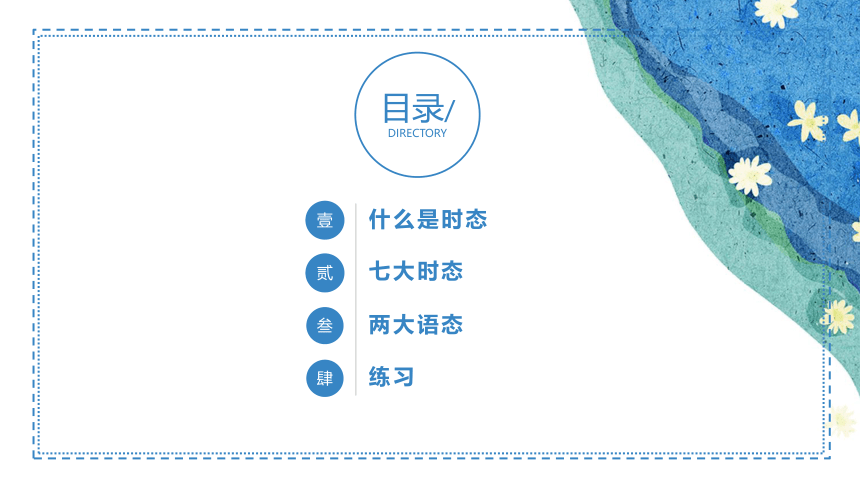

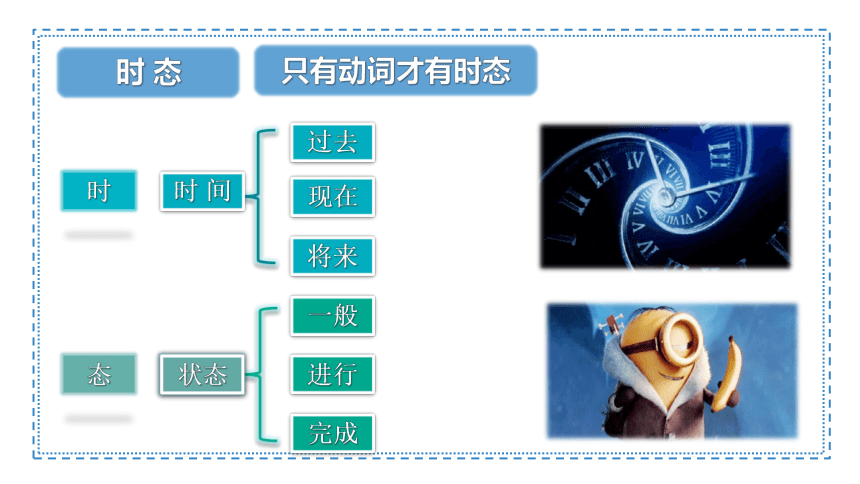

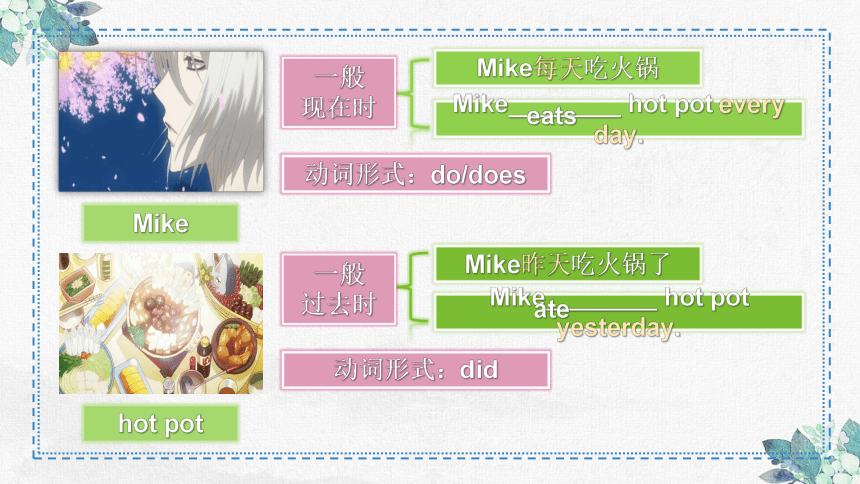
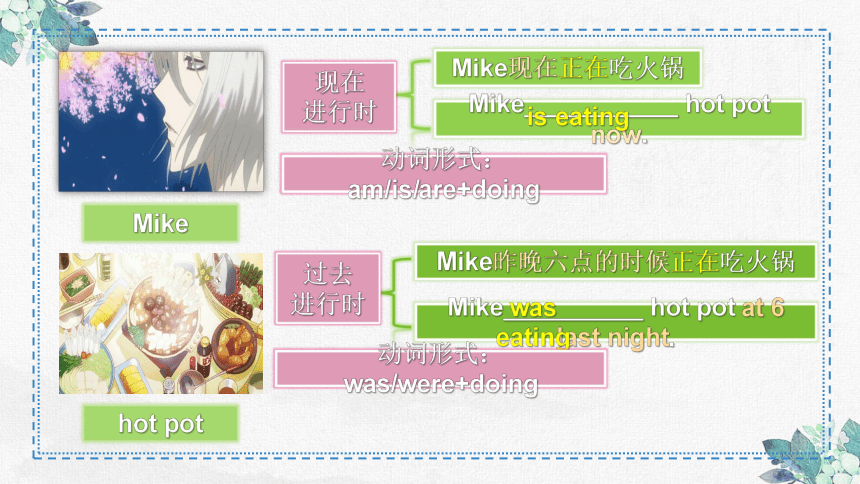
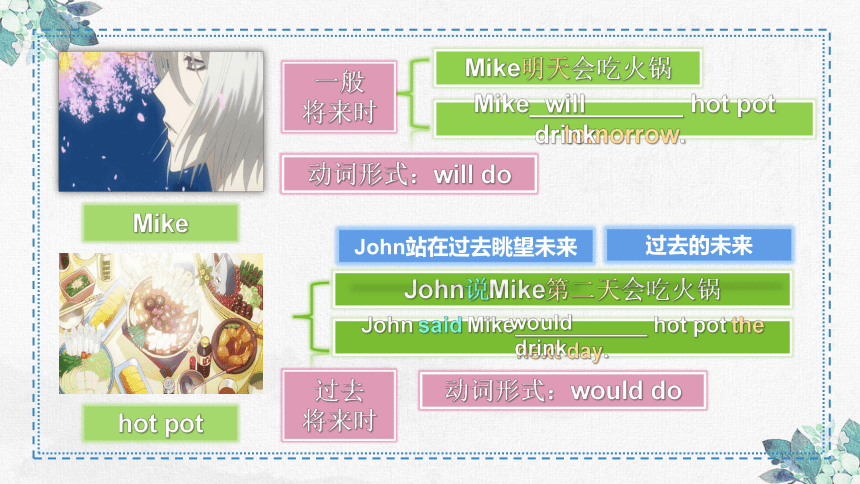
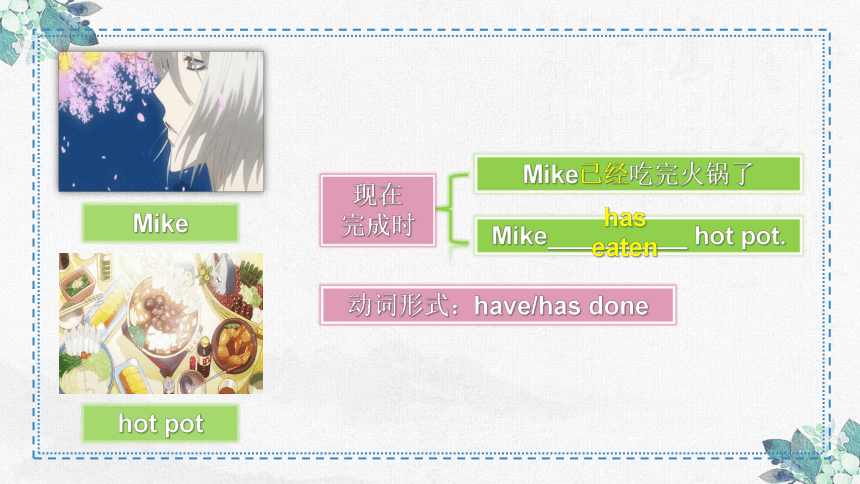
文档简介
(共26张PPT)
Unit 5 Grammar
林秋雯 903
壹
贰
叁
肆
什么是时态
七大时态
两大语态
练习
目录/
DIRECTORY
壹
什么是时态
时 态
时
时 间
过去
现在
将来
态
状态
一般
进行
完成
只有动词才有时态
贰
七大时态
Mike
hot pot
Mike每天吃火锅
Mike________ hot pot every day.
eats
一般
现在时
Mike昨天吃火锅了
Mike________ hot pot yesterday.
ate
动词形式:do/does
一般
过去时
动词形式:did
Mike
hot pot
Mike现在正在吃火锅
Mike___________ hot pot now.
is eating
现在
进行时
动词形式:am/is/are+doing
Mike昨晚六点的时候正在吃火锅
Mike__________ hot pot at 6 last night.
was eating
过去
进行时
动词形式:was/were+doing
Mike
hot pot
Mike明天会吃火锅
Mike___________ hot pot tomorrow.
will drink
一般
将来时
动词形式:will do
John说Mike第二天会吃火锅
John said Mike___________ hot pot the next day.
would drink
John站在过去眺望未来
过去的未来
过去
将来时
动词形式:would do
Mike
hot pot
Mike已经吃完火锅了
Mike__________ hot pot.
has eaten
现在
完成时
动词形式:have/has done
一般现在时
用法
经常性,习惯性的动作
He always helps others.
客观事实,普遍真理
He said the sun rises in the east and sets in the west.
标志词
always
often
usually
sometimes
seldom
never
every day
主将从现
主句用将来时,从句用一般现在时
一般过去时
用法
过去发生的动作
标志词
yesterday
last month
in 1999
two days ago
现在进行时
用法
正在发生或进行的动作
We are waiting for you now.
现阶段一直进行的活动
He is thinking about this problem these days.
You are always changing your mind.
表示反复发生的动作
表达特定的情感
通常与always, constantly, forever连用
am/is are + doing
标志词
now
these day
at the moment
at present
nowadays
现在进行时
am/is are + doing
用法
表示渐变
It’s getting warmer and warmer.
这样的动词有:
get,
turn,
become,
grow,
go,
run,
begin
I’m leaving tomorrow
The train is arriving soon
表移动的终止性动词(come, go, arrive, leave, start, begin, return等)用于现在进行时,表示即将要发生的动作
look
listen
过去进行时
was/were+ doing
用法
过去某个时间点正在发生的动作
I was listening to music at that time.
I was washing my hair when/while you knocked at the front door.
I was washing my hair while my brother was watching TV.
was/were doing +when/while+did
was/were doing +while+was/were doing
标志词
at that time
when
while
When/ While I was walking along the street, I heard the strange sound.
When/while +was/were doing, did
When/while:
当一个句子是过去进行时,另一个句子用过去式。
将来时
用法
表示将来
will do
be going to
shall do
移动的终止性动词(come, go, arrive, leave, start, begin, return等)用于现在进行时,表示即将要发生的动作
be doing
标志词
tomorrow
next week
soon
before long
in+一段时间
不久以后
现在完成时
have/has done
用法
持续
从过去持续到现在,可能还会继续持续下去
He has worked in that hospital for 8 years.
影响
过去发生的事情对现在仍然有影响
He has broken his left leg.
标志词
for
since
recently
lately
just
ever
never
so far
up to now
till now
from then on
in the past few years
already
yet
叁
语 态
语态
主动
do
被动
be done
语 态
只有动词才有语态
时态 主动语态 被动语态
1
一般现在时
do/does
am/is/are + done
2
一般过去时
did
was/were + done
3
一般将来时
will/shall+do
be going to+do
will/shall+be done
be going to+be done
4
现在进行时
am/is/are+doing
am/is/are+being done
5
过去进行时
was/were+doing
was/were+being done
6
现在完成时
have/has done
have/has been done
被动
be done
肆
Exercise
二、用所给单词的正确形式填空。
1. He’ll write to you as soon as he ____________(arrive) in Australia.
2. Jim won’t watch TV until he ____________(finish) his homework.
3. If it ___________(rain) tomorrow, I won’t go to the cinema.
4. She is going to be a nurse when she _____________(grow) up.
5. The bell for the class rang while they ___________(play) in the playground.
arrives
as soon as 一…就…
主将从现
finishes
rains
主将 if 现
grows
were playing
When/while: 当一个句子是过去进行时,另一个句子用过去式。
6. My father usually _____________(cook) breakfast for us.
7. The twins _____________( study) Chinese in an evening school now.
8. So far, spaceships without people ___________(reach) the moon and some other parts of the universe.
9. He told us that he _____________(stay) here till the next week.
10. The Chinese people ___________(work) hard to make their country stronger and more beautiful.
cooks
are studying
have reached
would stay
He站在过去眺望未来
过去的未来
are working
三、根据句子提示翻译。
1. 当我进入教室的时候玛丽正在写信。
Mary _____________ a letter when I came into the classroom.
2. 电话是什么时候被发明的?
When ____________ the telephone ____________
3. 我兄弟一到这里就会打电话给我。
My brother will call me as soon as he _____________ here.
4. ——你去过多少次长城?——仅一次。
—How many times _____________ you _____________ to the Great Wall
—Only once.
5. 我不知道她明天会不会来。
I don’t know whether she _____________ or not tomorrow.
was writing
was
invented
reaches
have
been
will come
主将从现
have been to 指去了某地 已经回来
have gone to 指去了某地 没回来
四、语法填空。
Early in the morning, at noon, or in the evening in big cities and in the countryside, all over the United States, you can see Americans running —men and women, young and old. People run everywhere. Some people even run in (1)___________ living room.
Running wasn’t so popular in the past. In the 1960s, runners were mostly athletes and (2)_________ (health) strong people. When people saw a runner, they used (3)___________(speak), “Hey, what’s the hurry for ” or they might say to (4)___________(they), “Is he crazy ” At that time, women almost never ran. If they did, they might (5)___________(laugh) at.
the
healthy
to speak
themselves
be laughed
运动员
Used to do sth.过去常常做…
被动 be done
But today all these have (6)___________(change). Men and women of all (7)___________(age) enjoy running. Doctors say many of the health (8)__________(problem) in America come from these bad habits: eating too much, (9)__________(smoke), and taking little exercise. Running is a kind of good exercise (10)___________ it helps build strong hearts and lungs.
完成时 have done
ages
problems
smoking
because
谢谢你的聆听
林秋雯 九年级
Unit 5 Grammar
林秋雯 903
壹
贰
叁
肆
什么是时态
七大时态
两大语态
练习
目录/
DIRECTORY
壹
什么是时态
时 态
时
时 间
过去
现在
将来
态
状态
一般
进行
完成
只有动词才有时态
贰
七大时态
Mike
hot pot
Mike每天吃火锅
Mike________ hot pot every day.
eats
一般
现在时
Mike昨天吃火锅了
Mike________ hot pot yesterday.
ate
动词形式:do/does
一般
过去时
动词形式:did
Mike
hot pot
Mike现在正在吃火锅
Mike___________ hot pot now.
is eating
现在
进行时
动词形式:am/is/are+doing
Mike昨晚六点的时候正在吃火锅
Mike__________ hot pot at 6 last night.
was eating
过去
进行时
动词形式:was/were+doing
Mike
hot pot
Mike明天会吃火锅
Mike___________ hot pot tomorrow.
will drink
一般
将来时
动词形式:will do
John说Mike第二天会吃火锅
John said Mike___________ hot pot the next day.
would drink
John站在过去眺望未来
过去的未来
过去
将来时
动词形式:would do
Mike
hot pot
Mike已经吃完火锅了
Mike__________ hot pot.
has eaten
现在
完成时
动词形式:have/has done
一般现在时
用法
经常性,习惯性的动作
He always helps others.
客观事实,普遍真理
He said the sun rises in the east and sets in the west.
标志词
always
often
usually
sometimes
seldom
never
every day
主将从现
主句用将来时,从句用一般现在时
一般过去时
用法
过去发生的动作
标志词
yesterday
last month
in 1999
two days ago
现在进行时
用法
正在发生或进行的动作
We are waiting for you now.
现阶段一直进行的活动
He is thinking about this problem these days.
You are always changing your mind.
表示反复发生的动作
表达特定的情感
通常与always, constantly, forever连用
am/is are + doing
标志词
now
these day
at the moment
at present
nowadays
现在进行时
am/is are + doing
用法
表示渐变
It’s getting warmer and warmer.
这样的动词有:
get,
turn,
become,
grow,
go,
run,
begin
I’m leaving tomorrow
The train is arriving soon
表移动的终止性动词(come, go, arrive, leave, start, begin, return等)用于现在进行时,表示即将要发生的动作
look
listen
过去进行时
was/were+ doing
用法
过去某个时间点正在发生的动作
I was listening to music at that time.
I was washing my hair when/while you knocked at the front door.
I was washing my hair while my brother was watching TV.
was/were doing +when/while+did
was/were doing +while+was/were doing
标志词
at that time
when
while
When/ While I was walking along the street, I heard the strange sound.
When/while +was/were doing, did
When/while:
当一个句子是过去进行时,另一个句子用过去式。
将来时
用法
表示将来
will do
be going to
shall do
移动的终止性动词(come, go, arrive, leave, start, begin, return等)用于现在进行时,表示即将要发生的动作
be doing
标志词
tomorrow
next week
soon
before long
in+一段时间
不久以后
现在完成时
have/has done
用法
持续
从过去持续到现在,可能还会继续持续下去
He has worked in that hospital for 8 years.
影响
过去发生的事情对现在仍然有影响
He has broken his left leg.
标志词
for
since
recently
lately
just
ever
never
so far
up to now
till now
from then on
in the past few years
already
yet
叁
语 态
语态
主动
do
被动
be done
语 态
只有动词才有语态
时态 主动语态 被动语态
1
一般现在时
do/does
am/is/are + done
2
一般过去时
did
was/were + done
3
一般将来时
will/shall+do
be going to+do
will/shall+be done
be going to+be done
4
现在进行时
am/is/are+doing
am/is/are+being done
5
过去进行时
was/were+doing
was/were+being done
6
现在完成时
have/has done
have/has been done
被动
be done
肆
Exercise
二、用所给单词的正确形式填空。
1. He’ll write to you as soon as he ____________(arrive) in Australia.
2. Jim won’t watch TV until he ____________(finish) his homework.
3. If it ___________(rain) tomorrow, I won’t go to the cinema.
4. She is going to be a nurse when she _____________(grow) up.
5. The bell for the class rang while they ___________(play) in the playground.
arrives
as soon as 一…就…
主将从现
finishes
rains
主将 if 现
grows
were playing
When/while: 当一个句子是过去进行时,另一个句子用过去式。
6. My father usually _____________(cook) breakfast for us.
7. The twins _____________( study) Chinese in an evening school now.
8. So far, spaceships without people ___________(reach) the moon and some other parts of the universe.
9. He told us that he _____________(stay) here till the next week.
10. The Chinese people ___________(work) hard to make their country stronger and more beautiful.
cooks
are studying
have reached
would stay
He站在过去眺望未来
过去的未来
are working
三、根据句子提示翻译。
1. 当我进入教室的时候玛丽正在写信。
Mary _____________ a letter when I came into the classroom.
2. 电话是什么时候被发明的?
When ____________ the telephone ____________
3. 我兄弟一到这里就会打电话给我。
My brother will call me as soon as he _____________ here.
4. ——你去过多少次长城?——仅一次。
—How many times _____________ you _____________ to the Great Wall
—Only once.
5. 我不知道她明天会不会来。
I don’t know whether she _____________ or not tomorrow.
was writing
was
invented
reaches
have
been
will come
主将从现
have been to 指去了某地 已经回来
have gone to 指去了某地 没回来
四、语法填空。
Early in the morning, at noon, or in the evening in big cities and in the countryside, all over the United States, you can see Americans running —men and women, young and old. People run everywhere. Some people even run in (1)___________ living room.
Running wasn’t so popular in the past. In the 1960s, runners were mostly athletes and (2)_________ (health) strong people. When people saw a runner, they used (3)___________(speak), “Hey, what’s the hurry for ” or they might say to (4)___________(they), “Is he crazy ” At that time, women almost never ran. If they did, they might (5)___________(laugh) at.
the
healthy
to speak
themselves
be laughed
运动员
Used to do sth.过去常常做…
被动 be done
But today all these have (6)___________(change). Men and women of all (7)___________(age) enjoy running. Doctors say many of the health (8)__________(problem) in America come from these bad habits: eating too much, (9)__________(smoke), and taking little exercise. Running is a kind of good exercise (10)___________ it helps build strong hearts and lungs.
完成时 have done
ages
problems
smoking
because
谢谢你的聆听
林秋雯 九年级
